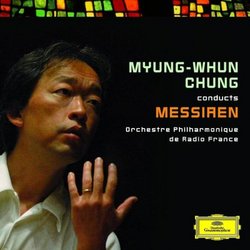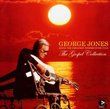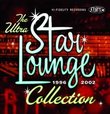| All Artists: Messiaen, Myung-Whun Chung, Roger Muraro, Valerie Hartmann-Claverie, Hélène Collerette, Catherine Cournot, Morgan Jourdain Title: Myung-Whun Chung Conducts Messiaen Members Wishing: 1 Total Copies: 0 Label: Deutsche Grammophon Original Release Date: 1/1/2008 Re-Release Date: 10/28/2008 Genre: Classical Styles: Opera & Classical Vocal, Chamber Music, Historical Periods, Modern, 20th, & 21st Century, Symphonies Number of Discs: 1 SwapaCD Credits: 1 UPC: 028947779445 |
Search - Messiaen, Myung-Whun Chung, Roger Muraro :: Myung-Whun Chung Conducts Messiaen
 | Messiaen, Myung-Whun Chung, Roger Muraro Myung-Whun Chung Conducts Messiaen Genre: Classical
As part of the 100th anniversary celebration of Messiaen, DG is releasing an all-new recording by Messiaen master, Myung-Whun Chung. The conductor, long associated with this music, has made numerous recordings of Messiaen'... more » |
Larger Image |
CD DetailsSynopsis
Album Description As part of the 100th anniversary celebration of Messiaen, DG is releasing an all-new recording by Messiaen master, Myung-Whun Chung. The conductor, long associated with this music, has made numerous recordings of Messiaen's works which have garnered many awards, including a Grammy® in 1995. Each of the three works on this album explores Messiaen's distinct use of color while focusing on a religious theme. A devoted Catholic, Messiaen wrote many works based on the beauty he found within religion. The Trois Petites Liturgies for piano, ondes martenot, choir and orchestra was premiered in occupied Paris in 1943, and received the highest praise by Jean Cocteau, Francis Poulenc and Arthur Honegger among others. With the aim of bringing "a kind of organized act of praise into the concert room" Messiaen created one of his most colorful and enduring works at this time--he himself described the music as "nothing but an act of love." Couleurs de la cité céleste combines the composer's love of birdsong and faith in one stunning piece. With the sounds of birds from New Zealand, Brazil, Venezuela, Argentina and Canada, Messiaen achieved a kaleidoscopic range of colors and sounds. The final work, Hymne pour grand orchestre, is an exercise in mysticism and religious fervor painted in a bold musical language. Similar CDs
|
CD ReviewsRare delicacy in TPL, in both senses R. Gregory Capaldini | Arlington, VA United States | 03/22/2009 (5 out of 5 stars) "Years ago I fell in love with Messiaen's "Trois Petites Liturgies" of 1944. Since then I've grabbed many of its rare recordings and this new one is a delight. Myung-Whun Chung conducts a remarkably delicate but solid performance by the strings, percussion and women's voices of Radio France. As ever comfortable with the composer's peculiar melange of low-carb Debussy, birdsong imitations and mid-century steel, Chung allows a few tiny idiosyncracies, like the lengthy crescendo closing the second movement. It's definitely the first time I've heard the vocal part sound so refreshingly young, and Roger Muraro's clear but un-bang-y piano playing effectively seals the nimble approach. "Liturgies" takes half the disc and easily justifies purchase on its own. (Anyone wishing to purchase a comparative reading should try the Bernstein re-issue on Sony, it's segments also available here as MP3 downloads.) "Couleurs de la cite celeste" is from two decades later and is more rigorously abstract and ornithological, with a deliberately hard-edged tonal palette omitting strings, keeping the piano, and adding brass plus a tangy, quicksilver trio of clarinets. Interestingly, it's the broader-paced brass chorales that sweeten this number. The wash of strings opening the last selection, "Hymne pour grand orchestre" is a balm for those wishing to re-visit the post-Impressionist emollients of the "Liturgies." Messiaen had to re-compose the music in 1946 after its score and parts were lost, but he seems to have retained the flavor of the 1932 original. So often the case with Messiaen, the piece is ostensibly sacred in inspiration but feels ecstatically Tristan-esque through much of its duration. I had not heard either "Coleurs" or "Hymne" before, and it's a privilege to add these works to my library. Had you predicted 20 years ago that a German record company would engage a Korean-born pianist-conductor to issue a definitive set of Messiaen's difficult and French-to-the-core orchestral works, I'd have laughed. The joke's on me, since that's indeed the case." Messiaen not to be scared of Santa Fe Listener | Santa Fe, NM USA | 11/05/2008 (4 out of 5 stars) "As someone who has found it hard to enter Messiaen's more monolithic music, I can still recognize the theatrical and ritualistic impact made by his visionary "acts of praise" to God. Often there's a disconnect -- for the uninitiated, at least -- between the composer's rapturous titles, with their deeply Catholic resonance, and the daring extremes of sound/texture that make Messiaen's densest works real shockers. No shocks here, however. All of this music could fit reverently into a church setting without driving parishioners from their pews.
The Three Little Liturgies from 1943 precede the volcanic Turangalilia symphony by only three years, but except for scattered rumblings and Messiaen's characteristic "birdsong" piano writing, the harmonies could be from Poulenc or Honegger. With its floating ethereal voices, the prevailing tone is gentle until the last liturgy, which grows more jubilant (not that Messiaen's style fits the conventional idea of praising God). It's also here that we notice the (rather discreet) whoops from the spooky ondes martinots that the composer loved. "Colors of the Celestial City" combines piano -- very intensely imitating tropical birdsongs -- a battery f percussion, the xylophone promiment among them, and winds. If you didn't know the title, you'd never suspect a religious connection. This sounds like a Parisian variant of Bartok's Sonata for Two Pianos, Percussion, and Celesta. Just as the Trois Liturgies suffers by seeming less memorable than Stravinsky's Symphony of Psalms, this work seems rather pale beside the Bartok, but it affords exposure to Messiaen's extravagant use of color. For my part, I lose interest in cascading bird calls very quickly. Ominous brass and tam tam interjections keep the piece alive, however. The final work, "Hymn to Saint-Sacrement," abolishes percussion in favor of closely harmonized strings and winds. The main part of the work is static, shimmering, and atmospheric, evoking the stasis of ecstasy, I suppose. There's a distinct flavor of Ravel but without melody or a central voice -- is there such a thing as Ravel karaoke? To realy listen, you need to let the atmospherics sink in rather than asking for what the composer has deliberately left out. Since the violin writing involves long stretches of tremolos and an arching line of semi-melody at the end that never quite sings, I wasn't captivateed. Most of this CD, which times out around an hour, doesn't convince me that Messiaen is a genius, but I bow to those who claim he is. Myung-Whun Chung leads the Radio France forces with full commitment, but I msut say tat the chorus was rather trembly in the Trois Liturgies, and the wind soloists were scrappy and thin. DG's sonics are fine. " |

 Track Listings (5) - Disc #1
Track Listings (5) - Disc #1



